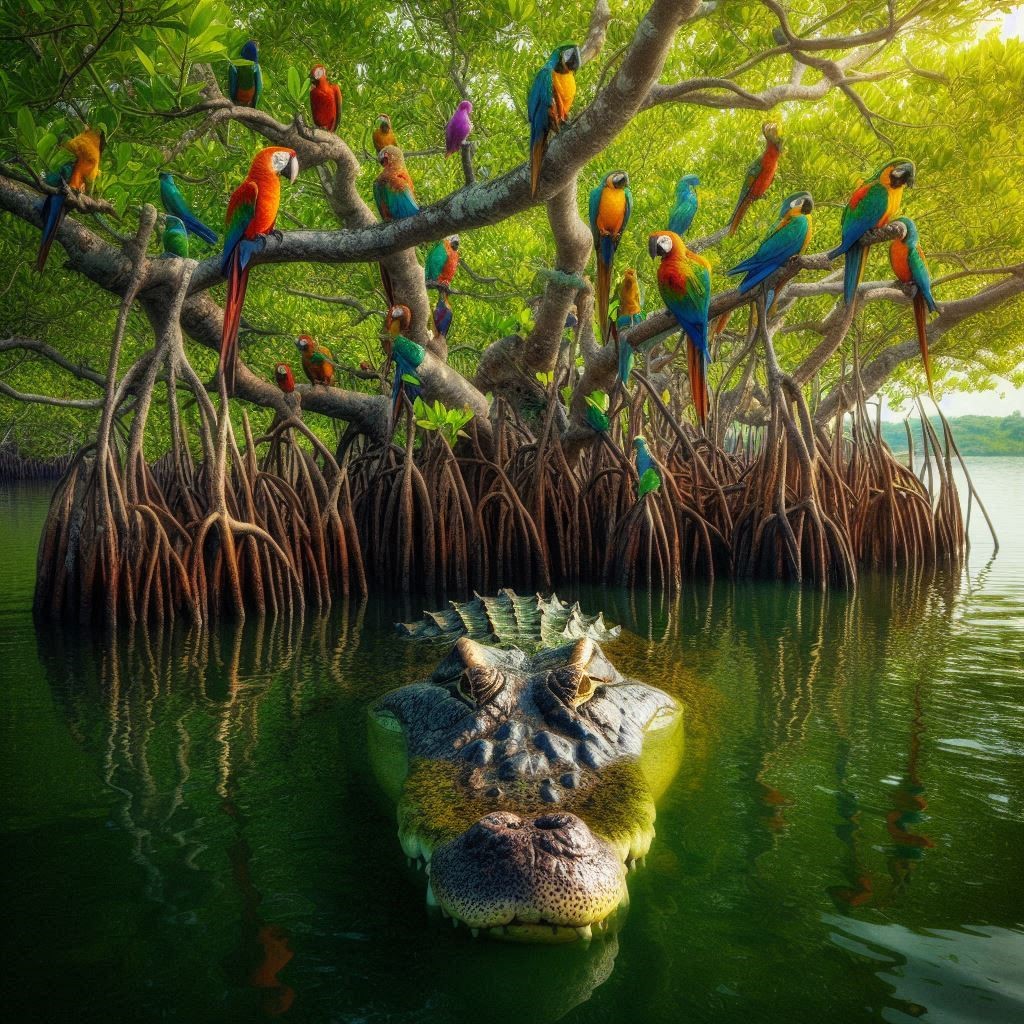- Introduction
- The History and Folklore of Lake Maracaibo
- Scientific Evidence: Do Crocodiles Really Exist in the Lake?
- Possible Explanations for the Legend
- Local Perspectives and Personal Accounts
- The Impact of the Legend on Tourism
- Final Verdict: Fact or Fiction?
- Conclusion: lake maracaibo crocodile Myths: What You Need to Know
- FAQ’s
- General Information
- Habitat and Behavior
- Conservation and Management
Introduction
Nestled in the heart of Venezuela, Lake Maracaibo is shrouded in mystery and intrigue. This vast body of water has long been a source of legends, captivating both locals and curious travelers alike. Among its many tales lies the enigmatic story of the Lake Maracaibo crocodile—a creature that stirs imaginations with thoughts of lurking predators beneath its surface. Is there any truth to this legend? As we dive deeper into the folklore surrounding this lake, we’ll uncover historical accounts, scientific insights, and personal stories from those who call this region home. Join us on an exploration where myth meets reality as we seek to unravel the enduring enigma of the lake maracaibo crocodile.
The History and Folklore of Lake Maracaibo
Lake Maracaibo is steeped in rich history and captivating folklore. This expansive body of water has long been a source of stories that blend reality with myth.
Local tales often speak of ancient tribes who believed the lake was home to powerful spirits, guarding treasures hidden beneath its waters. Fishermen recounted sightings of strange creatures gliding through the depths, igniting imaginations across generations.
The Spanish colonizers arrived in the 16th century, adding their own legends about monstrous beasts lurking below. These stories evolved over time, as they were passed down orally from one storyteller to another.
From ghostly apparitions to mythical beings resembling crocodiles or serpents, Lake Maracaibo became synonymous with mystery and intrigue. Each account contributes to a tapestry of cultural narratives that continue to fascinate both locals and visitors alike.
Scientific Evidence: Do Crocodiles Really Exist in the Lake?
When it comes to the lake maracaibo crocodile, scientific evidence is a crucial aspect of unraveling this mystery. Researchers have scoured the waters for signs of these elusive creatures.
Surveys conducted in the region often focus on different species that inhabit freshwater and brackish environments. While some reports mention sightings, no definitive proof has been established.
Local wildlife experts stress the importance of habitat suitability. The conditions within Lake Maracaibo may not support a sustainable crocodile population long-term.
Additionally, environmental factors such as pollution and climate change can impact aquatic life, making it harder for any reptilian residents to thrive.
The lack of tangible evidence leaves many questions unanswered about this captivating legend. continued exploration may one day reveal surprising truths hidden beneath the surface of Lake Maracaibo’s waters.
Possible Explanations for the Legend
The legend of the Lake Maracaibo crocodile may have roots in misconceptions or misidentifications. Locals often describe large creatures lurking beneath the water’s surface, which could easily be confused with crocodiles.
Reports from fishermen tell tales of giant fish that resemble reptiles. The murky waters might distort their appearance, leading to exaggerated stories.
Additionally, cultural narratives play a significant role in shaping such legends. Stories passed down through generations can morph into something more mysterious and fearsome over time.
Another factor is the psychological aspect of folklore. People often create myths around natural phenomena as an attempt to explain the unknown. In regions like Lake Maracaibo, where nature’s beauty hides many secrets, it’s easy for imaginations to run wild.
These explanations provide insight into how this captivating tale continues to thrive within local culture while blurring the lines between fact and fiction.
Local Perspectives and Personal Accounts
The tales surrounding the Lake Maracaibo crocodile are deeply embedded in local culture. Residents often recount encounters that blur the line between reality and myth. Some fishermen share stories of strange splashes in the water, claiming they saw a massive creature lurking beneath the surface.
Others recount childhood fears instilled by family lore, warning them not to swim too far from shore. “You can’t trust what lurks in those waters,” one elder declared with a knowing smile.
Local tour guides play up these legends, adding an air of mystery to their excursions. They weave narratives about ancient spirits protecting hidden treasures within the lake’s depths.
Personal accounts vary widely, creating a tapestry of belief and skepticism. For many locals, whether real or imagined, the legend serves as a reminder of nature’s mysteries—and as an invitation for adventure amid Lake Maracaibo’s enchanting landscape.
The Impact of the Legend on Tourism
The legend of the Lake Maracaibo crocodile has become a captivating draw for tourists. Visitors flock to witness the mystique surrounding this mythical creature. The stories fuel curiosity and inspire adventure.
Local tour operators have capitalized on this intrigue, offering guided trips around the lake. Tourists can explore picturesque landscapes while searching for elusive signs of crocodiles. These tours often blend local folklore with natural beauty, enhancing the experience.
Moreover, businesses have sprung up in response to increased interest. Souvenir shops sell everything from plush crocodiles to art depicting these creatures. Restaurants feature themed dishes that celebrate the legend, further embedding it into local culture.
This unique aspect enriches tourist experiences while supporting community economies. The allure of unknown creatures keeps travelers coming back for more, eager to engage with both nature and myth in this enchanting region.
Final Verdict: Fact or Fiction?
The truth about the Lake Maracaibo crocodile remains elusive. While many tales circulate, scientific scrutiny reveals a different picture.
Reports suggest that crocodiles do inhabit nearby rivers and marshes, but not specifically within the lake itself. The folklore surrounding these creatures often stems from local myths passed down through generations.
Witness accounts vary widely in credibility. Some claim to have spotted large reptiles basking on shores, yet others dismiss these sightings as mere exaggerations or misidentified animals.
What’s clear is that the legend thrives largely due to its captivating nature. It draws attention and curiosity from both locals and tourists alike.
So, are there actually crocodiles in Lake Maracaibo? The answer isn’t black-and-white; it exists somewhere in the gray area of myth and reality.
Conclusion: lake maracaibo crocodile Myths: What You Need to Know
The legend of the Lake Maracaibo crocodile has captivated many. The tales have been passed down through generations, blending fact with folklore in a mesmerizing way. While scientific evidence hasn’t confirmed the presence of crocodiles in this vast and unique lake, the stories persist.
Locals offer vibrant narratives that breathe life into these myths. Personal accounts add depth to the mystery, revealing how deeply intertwined these legends are with the culture surrounding Lake Maracaibo. Tourists often seek out this enigma, driven by curiosity and a thirst for adventure.
As you explore Lake Maracaibo and its surroundings, keep an open mind about what you encounter. The beauty of this region lies not just in its landscapes but also in its rich tapestry of stories. Whether or not crocodiles roam beneath its waters may remain uncertain; however, it’s clear that their legacy will continue to thrive among locals and visitors alike.
Understanding lake maracaibo crocodile myths enriches your experience here. Each story adds another layer to this enchanting destination—one where nature meets imagination seamlessly.
FAQ’s
General Information
The Lake Maracaibo crocodile is a term used to refer to the American crocodile (Crocodylus acutus) found in Lake Maracaibo, Venezuela. This species is native to the region and can be spotted in both freshwater and brackish environments.
Lake Maracaibo is located in northwestern Venezuela. It is one of the largest lakes in Latin America and is connected to the Gulf of Venezuela.
Crocodiles inhabit Lake Maracaibo due to its connection to the Gulf of Venezuela, which allows for the movement of these reptiles between marine and freshwater environments.
Habitat and Behavior
Lake Maracaibo crocodiles prefer brackish and freshwater environments, such as the mangroves, swamps, and river mouths around the lake. They are adaptable and can live in various water conditions.
While Lake Maracaibo crocodiles can be dangerous, attacks on humans are relatively rare. They are generally shy and avoid human contact, but caution is always advised when in their habitat.
These crocodiles are opportunistic feeders and primarily consume fish, birds, and small mammals. They may also eat carrion if other food sources are scarce.
Conservation and Management
The American crocodile, including those in Lake Maracaibo, is listed as “Least Concern” by the International Union for Conservation of Nature (IUCN). However, local populations may face threats from habitat destruction and pollution.
Threats to these crocodiles include habitat loss due to deforestation, water pollution, and human encroachment. Conservation efforts focus on protecting their habitat and reducing human-wildlife conflicts.
Yes, various conservation programs aim to protect the habitat of Lake Maracaibo crocodiles and promote awareness about their importance. Local and international organizations work to mitigate threats and support sustainable management practices.
To safely observe Lake Maracaibo crocodiles, it is best to join guided tours led by local experts. Maintain a safe distance, avoid feeding or provoking the crocodiles, and respect local wildlife regulations to ensure both your safety and the well-being of the crocodiles.



